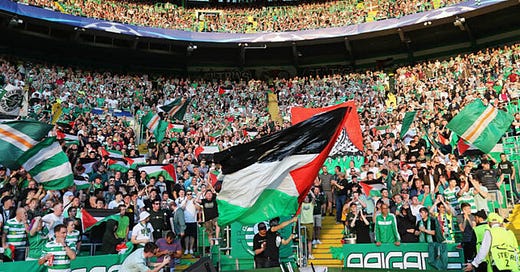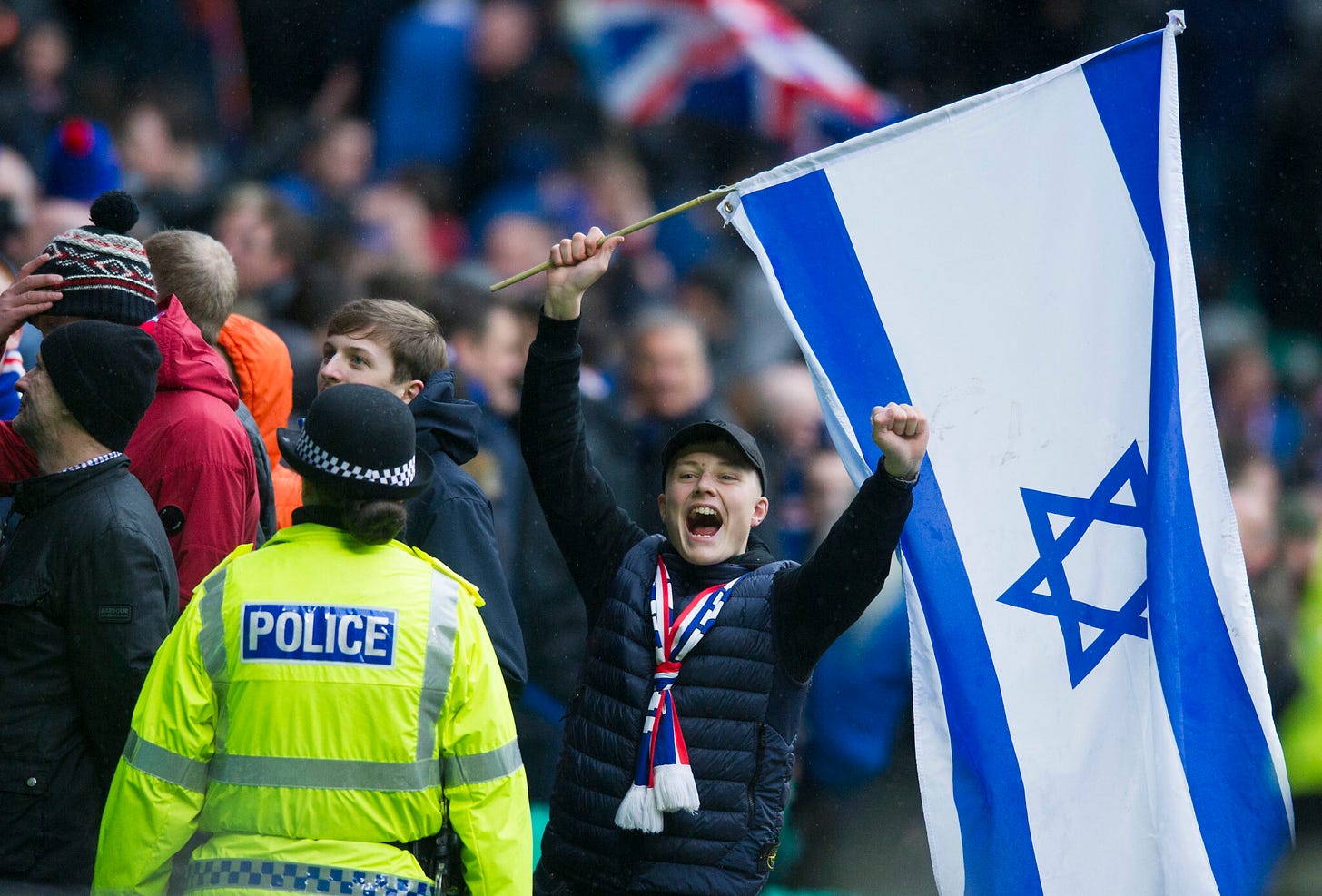The Glasgow Divide: Celtic, Rangers, and the Israel-Palestine Conflict
The rivalry between Celtic and Rangers has always transcended football, embodying deeper societal, political, and cultural divides.
The footballing rivalry between Celtic and Rangers in Glasgow has always been symbolic of deeper divides within the city. Founded on religious, class, and political divides, Glasgow's derby is a microcosm of some of the historical tensions within Scottish society. Seen as Catholic versus Protestant, left-wing versus right-wing, the divide has now extended internationally with the Israel-Palestine conflict the new battleground.
Celtic fans have shown their solidarity with Palestine, aligning their cause with the historical struggles of their Irish Catholic ancestors. While Rangers fans have taken a pro-Israel position.
Celtic and Solidarity with Palestine
Celtic's identity has always been linked with the story of resistance and in support of the oppressed. The club, founded in 1887 by Irish Catholic priest Brother Walfrid, was the exact embodiment of one marginalised community struggling for dignity and equality against the systemic discrimination dealt out by a local Protestant community. Today, this ethos has moved forward onto anti-colonial and anti-imperialist causes across the world by fans of Celtic.
The Celtic fans relate to the plight of the Palestinian people. They find in the struggle of Palestine a reflection of Ireland's own colonisation, partition, and resistance to British imperialism. Indeed, the comparison between Ireland and Palestine is striking: loss of land, displacement of the local populace, genocide, and the ongoing fight for self-determination.
That solidarity has been manifested visibly, most notably in the displays of Palestinian flags at Celtic Park during both domestic and European matches. In 2016, during Celtic’s Champions League qualifier against Israeli side Hapoel Be'er Sheva, the Green Brigade raised hundreds of Palestinian flags in defiance of the UEFA rules. An act against Israel's apartheid policies and their occupation of Palestinian territories.
Subsequently, the club was fined by UEFA, however the group stuck two fingers up at Europe's football governing body and turned the penalty into a fundraising campaign which received worldwide media coverage, raising over £170,000 for Palestinian charities.
For Celtic fans, it is more than politics. It shows their wider belief in justice, human rights, and the fight against oppression. Supporting Palestine means being on the right side of history.
Rangers and Pro-Israel Allegiances
Across the city, a pro-Israel position has been taken up by Rangers fans, aligning the fans with the conservative and unionist category. Furthermore, Rangers are deeply identified with Protestant Unionism and loyalty to the British monarchy. This has translated into support for imperialist policies and opposition to those perceived as threats to the British state.
This has translated into a natural affinity among Rangers supporters for Israel, which is often presented in right-wing circles as a bastion of Western values and a frontline state against Islamic extremism. For Rangers supporters, the Israeli flag is waved to oppose what Celtic supporters do predominantly, with the cause of the Israelis secondary. It is a continuation of the "us versus them" mentality that has defined the Glasgow rivalry for over a century.
But this alignment is highly troubling. While Celtic support the rights of an oppressed people, Rangers' pro-Israel stance seems to celebrate state-sponsored terrorism, occupation, and systemic discrimination. It's difficult to view the images of Rangers fans bedecked with Israeli flags at Ibrox with the ideals of justice and equality. Instead it triggers a disturbing support for imperialism and an endorsement of oppression.
The Politics of Division
Glasgow as a city has always been a melting pot for world issues. In the same way that the Glasgow derby is synonymous with the politics of Northern Ireland, it is now being viewed through Middle Eastern geopolitics.
For many Celtic fans, the parallels between Ireland and Palestine are more than historical. A shared history of deprivation, diaspora, and resistance against a more powerful occupying force. Their left-wing politics and support for social justice, extends beyond football.
For fans of Rangers, the pro-Israel stance is less about genuine support for Israeli policies and more about opposition to Celtic's allegiances. Rangers fans are not waving Israeli flags to show support for Israel, they are simply corroborating the fact they are against all that Celtic fans stand for.
On the Right Side of History
History has a way of judging these allegiances. Those who stood against South African apartheid in the 1980s were often vilified by the establishment, yet today they are celebrated as heroes. The same shall hold true for Palestine. International human rights organisations including Amnesty International and Human Rights Watch have condemned Israel as an apartheid state. The United Nations has repeatedly called for the occupation to be brought to an end, for recognition of Palestinian statehood – yet anyone who stands against the Israeli state are denounced as anti-Semitic – a well-known tactic among western politicians and activists, the majority of whom have very ‘close’ ties with Israeli lobbyists and their local Jewish communities, supplemented by their all expenses paid trips to the Holy land.
Celtic fans are not just expressing their political beliefs, they are standing on the right side of history. They are following the club’s founding principles of charity, compassion, and justice. Even if the Celtic board don’t believe that to be true.
Yet the pro-Israel position of Rangers fans places the club in support of a legacy of oppression and imperialism.
The Glasgow Derby was never just about the football. It's a story of the city and its history, its culture, and its politics, seen through the struggles of its people and the great issues of the time.
Glasgow's footballing divide sends a clear indication that the fight for justice is never confined by national borders or geography. In this struggle, the path that Celtic fans have chosen is a decision that history will vindicate.






